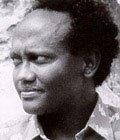
Abdourahman A. Waberi is a poet and writer, born in Djibouti.
"For almost two hundred years now, since the defeat of Napolean III., the collapse of the colonial empire and the ensuing hegemony of the United States, sweet ‘ole France is really very tiny.This country has become a trusted landscape for me".
I study the natives in their natural environment. However formidable, the major difference between me and professional anthropologists is that I don’t work for any investigative institution, but instead do it at my own expense. My moneybag suffers because of it, but who really cares. In Africa, investigations and apprenticeships are devaluated to such an extent that mothers already begin to worry about their daughter’s future as soon as they are old enough to marry, telling their admirers, “Hey, you! Go work or teach!"
Novelist, journalist, essayist, poet. Abdourahman A. Waberi was born in 1965 in Djibouti. He spent his childhood and adolescence in Northeast Africa. As Djibouti declared its independence from France in 1977, Waberi was just twelve years old, and he was heavily influenced by the upheavals of the time. He describes a feeling of “companionship” with his country, and fosters a feeling of literary obligation towards it. In 1985, he left what he considers to be the “mininature Republic” of Djibouti and traveled to Caen, France, where he began his studies of English language and literature.
Waberi is the author of numerous novels, essays, articles, and travel reports. His articles, short stories, and reviews are published in many international magazines and newspapers, including Le Monde diplomatique, Africultures, Le Monde, Libération, Le Nouvel Observateur, Jeune Afrique Economie, DU, Grand Street, and Lettre International. Waberi also works as a consultant for the French publishing house Le Serpent à Plumes on the selection of African and Black Diaspora literatures.
Waberi’s first volume of stories Le Pays Sans Ombre was published in 1994. That same year, the book received the Grand prix de la Nouvelle francophone from the Académie Royale de Langue et de Littérature Française de Belgique and the Prix Albert Bernard from the Académie des Sciences d’Outre-mer de Paris. In 1996, Waberi published another volume of stories entitled Cahier nomade (Nomad Notebook), which received the acclaimed Grand Prix Littéraire de l’Afrique noire prize. Waberi’s first novel Balbala was published in 1997. His first volume of poems Les Nomades, mes frères, vont boire à la Grande Ourse was published in 2002.
In 1998, the organizers of the Lille festival Fest’Africa invited Abdourahman Waberi to travel to Kigali as part of the Project Rwanda: écrire par devoir de mémoire. Together with nine other writers, a film director, and a sculptor, he attempted to provide a response to the 1994 genocide in Rwanda as an artist. He created a fictional piece entitled Moisson de Crânes: textes pour le Rwanda. In 2000, Le Serpent à Plumes published this mixture of essays, travelogues, and short stories. Waberi then published Rift, Routes, Rails (2001), a series of short stories on the twin themes of exile and nomadism. He characterizes his most recently published novel, Transit (2003), as a “universal chronicle on the subject of war and exile.” The novel recently won the Prix littéraire de la ville de Caen 2004.
Waberi’s books have been translated into German, English, Italian, Spanish, and Serbian. Le Pays Sans Ombre and the Project Rwanda: écrire par devoir de mémoire have been adapted for the stage.
Abdourahman Waberi currently lives with his family in Caen, Normandy, where he works as an English teacher.
Courtesy of Waridaad
No comments:
Post a Comment